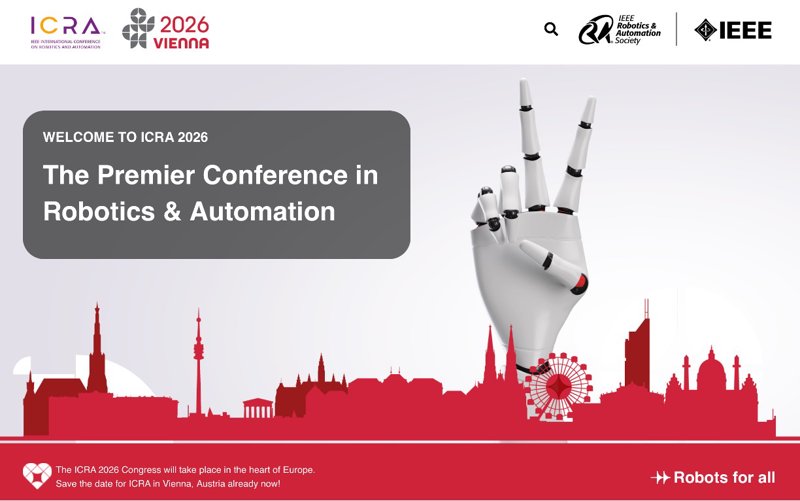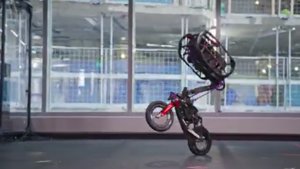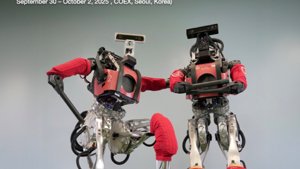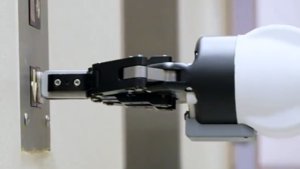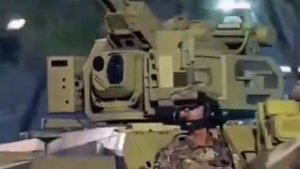Frequently Asked Questions About ICRA 2026 Vienna
Q: When and where is ICRA 2026 taking place? A: ICRA 2026 will be held June 1-5, 2026, in Vienna, Austria. The conference takes place in the heart of Europe, making it easily accessible for international attendees.
Q: What does ICRA stand for and why is it important? A: ICRA is the IEEE International Conference on Robotics and Automation, the premier global conference for robotics research and innovation, organized by IEEE RAS (Robotics and Automation Society).
Q: What is the theme for ICRA 2026? A: The theme is “Robots for all,” emphasising the democratisation of robotics technology and its accessibility across all sectors of society.
Q: What types of competitions will be featured at ICRA 2026? A: ICRA traditionally features cutting-edge robotics competitions including autonomous navigation challenges, robotic grasping competitions, sim-to-real challenges, and multi-agent racing events.
Mark your calendars, robotics enthusiasts! The IEEE International Conference on Robotics and Automation (ICRA) 2026 is heading to the magnificent city of Vienna, Austria, from June 1-5, 2026. As the world’s foremost gathering for robotics and automation research, ICRA 2026 promises to be a watershed event that will shape the future trajectory of our field. RoboHorizon Magazine will be there to deliver comprehensive coverage of this pivotal conference.
Vienna: The Perfect European Hub for Robotics Innovation
Why Vienna? The Austrian capital represents an exquisite convergence of historical elegance and cutting-edge innovation. ICRA 2026 organisers have selected Vienna as the ideal location to unite researchers, engineers, and industry leaders from across the globe. The city’s central European location provides seamless accessibility for participants from both European research institutions and international delegations.
Vienna’s rich tradition in engineering and technology, paired with Austria’s flourishing robotics ecosystem, creates an inspiring backdrop for discussions about the future of automation. The theme “Robots for all” perfectly encapsulates the conference’s mission to democratise robotics technology and make it accessible throughout all sectors of society.
The ICRA Legacy: Why This Conference Matters
The IEEE International Conference on Robotics and Automation isn’t merely another academic gathering—it’s the definitive event where breakthrough research intersects with practical application. Organised by the IEEE Robotics and Automation Society (RAS), ICRA has served as the launching pad for countless innovations that have transformed our world.
From the latest advances in artificial intelligence and machine learning to groundbreaking developments in human-robot interaction, ICRA consistently presents research that transitions from laboratory benches to real-world applications. The conference’s influence extends far beyond academia, directly impacting industries from manufacturing and healthcare to space exploration and autonomous vehicles.
Competition Highlights: Where Innovation Meets Challenge
One of ICRA’s most thrilling aspects is its competitive programme, featuring challenges that push the boundaries of current robotics capabilities. Based on the competition landscape, here’s what we can expect to see evolve for ICRA 2026:
The BARN Challenge: Navigating Real-World Complexity
The Benchmark Autonomous Robot Navigation (BARN) Challenge addresses one of robotics’ most persistent problems: autonomous navigation in constrained, cluttered environments. While many assume navigation is a “solved problem,” robots still struggle in scenarios like:
- Tightly constrained spaces with novel obstacles
- Adversarial search and rescue environments
- Naturally cluttered household settings
- Congested social spaces like offices and cafeterias
The BARN Challenge has grown dramatically since its inception, evolving from 5 teams in Philadelphia to international competitions spanning multiple continents. For ICRA 2026, expect even more sophisticated scenarios that test the limits of current navigation algorithms.
Robotic Grasping and Manipulation Competition
Now in its 10th edition, the Robotic Grasping and Manipulation Competition (RGMC) continues to challenge teams with increasingly complex manipulation tasks. Previous editions have featured:
- Manufacturing assembly and disassembly tasks
- Service robot scenarios including table setting and cloth folding
- Logistics challenges with bin picking and object rearrangement
- Human-robot interaction scenarios with object handovers
RGMC consistently drives research toward more realistic scenarios encountered in daily life, bridging the gap between laboratory demonstrations and practical applications.
Sim2Real Challenges: Bridging Virtual and Physical Worlds
The 4th Robotic Sim2Real Challenge tackles one of the most critical issues in modern robotics: the gap between simulation and reality. As training robots in simulation becomes increasingly important due to the high cost of real-world data collection, these challenges explore:
- Effective methods for transferring learned behaviours from simulation to real robots
- Data augmentation techniques using simulators
- Systematic approaches to matching simulated and real-world performance
With 56 teams from 17 countries participating in recent editions, this challenge highlights the global importance of solving the sim-to-real transfer problem.
Bimanual Teleoperation and Learning
The “What Bimanual Teleoperation and Learning from Demonstration Can Do” (WBCD) competition addresses industry-critical metrics often overlooked in academic research:
- Motion speed and system robustness
- Cost efficiency of teleoperation systems
- Learning effectiveness from human demonstrations
- Task completion quality across various difficulty levels
This competition brings together researchers and industry to identify the best fits between valuable tasks and technology solutions, using everything from VR systems to exoskeletons for human-robot interaction.
Earth Rover Challenge: Open-World Navigation
The Earth Rover Challenge explores the frontier of open-world autonomous navigation using a globally distributed fleet of outdoor robots. This ambitious competition:
- Tests foundation models for robot navigation across multiple cities
- Evaluates truly open-world navigation scenarios without known maps
- Compares AI-driven autonomous performance against human teleoperation
- Releases substantial real-world navigation datasets (>5,000 hours across 10+ cities)
Quadruped Robot Challenges: Multi-Agent Dynamics
The Quadruped Robot Challenges (QRC) are evolving toward Stage 2 for ICRA 2025-2026, introducing multi-robot collaboration concepts. Teams will tackle:
- Advanced autonomous traversability across various terrains
- Dynamic obstacle navigation and real-time perception
- Multi-agent coordination and collaborative planning
- Inspection missions in challenging environments
Roboracer Autonomous Grand Prix: High-Speed Competition
The 24th Roboracer Autonomous Grand Prix continues the tradition of high-speed autonomous racing with the theme “MAD-GAMES: Multi-Agent Dynamic Games.” This competition challenges teams to:
- Build 1:10 scaled autonomous race cars
- Develop algorithms for perception, planning, and competitive control
- Navigate multi-agent racing scenarios with overtaking and collision avoidance
- Bridge classical planning approaches with modern reinforcement learning
Research Tracks and Innovation Themes
While detailed programming for ICRA 2026 is still being developed, the conference traditionally covers the full spectrum of robotics research:
Core Technical Areas
- Autonomous Systems: Navigation, planning, and decision-making
- Manipulation and Grasping: Dexterous robotics and tactile sensing
- Human-Robot Interaction: Collaborative robotics and social navigation
- Machine Learning for Robotics: Deep learning, reinforcement learning, and foundation models
- Perception and Sensing: Computer vision, LIDAR processing, and multi-modal fusion
Emerging Research Frontiers
- Embodied AI: Integration of large language models with robotic systems
- Sustainable Robotics: Energy-efficient designs and environmental considerations
- Bio-Inspired Robotics: Learning from nature for improved robot capabilities
- Swarm Robotics: Multi-agent coordination and collective intelligence
- Space and Extreme Environment Robotics: Robots for exploration and hazardous operations
Industry Engagement and Career Opportunities
ICRA 2026 will feature extensive industry programming, including:
- Career Fair: Direct interaction with leading robotics companies
- ICRA Expo: Industry exhibitions showcasing commercial robotics solutions
- Technical Tours: Behind-the-scenes access to European robotics facilities
- Partnership Opportunities: Networking between researchers and industry leaders
The conference serves as a crucial bridge between academic research and commercial application, often resulting in technology transfer, startup formation, and collaborative research initiatives.
Vienna Experience: Beyond the Conference
Vienna offers conference attendees a unique cultural experience alongside cutting-edge robotics research. The city’s combination of imperial architecture, world-class museums, and vibrant café culture provides the perfect environment for informal networking and collaboration.
Austria’s growing position in European robotics, combined with the country’s strong engineering traditions, makes Vienna an ideal location for fostering international collaborations and discussing the future of robotics in European society.
Looking Forward: The Impact of ICRA 2026
As robotics technology rapidly advances toward mainstream adoption, ICRA 2026 will likely be remembered as a pivotal moment. The conference’s timing coincides with:
- Commercial Humanoid Deployment: As humanoid robots transition from research to real-world applications
- AI Integration Maturation: When large language models and foundation models become standard in robotics
- European Robotics Leadership: Vienna’s role in establishing Europe as a global robotics hub
- Sustainability Focus: Increased emphasis on environmentally responsible robotics development
What RoboHorizon Will Bring You
RoboHorizon Magazine will provide comprehensive coverage of ICRA 2026, including:
- Competition Analysis: In-depth coverage of all major robotics challenges
- Research Highlights: Expert analysis of breakthrough papers and presentations
- Industry Insights: Interviews with leading robotics companies and startups
- Technology Trends: Identification of emerging themes and future directions
- European Robotics Focus: Special attention to European innovation and collaboration opportunities
- Career and Educational Content: Guidance for students and professionals entering the field
Registration and Participation
While detailed registration information for ICRA 2026 will be released in summer 2025, interested participants should:
- Monitor the official ICRA 2026 website for updates
- Consider IEEE RAS membership for conference discounts and networking opportunities
- Plan research submissions if contributing to the technical programme
- Explore competition participation for hands-on robotics challenges
- Book accommodations early as Vienna is a popular destination
The Bigger Picture: Robotics in 2026
By June 2026, the robotics landscape will likely look significantly different from today. ICRA 2026 will capture this transformation, addressing:
- Real-World Robot Deployment: Moving beyond demonstrations to daily-use applications
- Ethical and Social Implications: Responsible development and deployment of robotics technology
- Global Collaboration: International cooperation in robotics research and development
- Accessibility and Inclusion: Making robotics technology available to diverse communities worldwide
Conclusion: A Conference for the Future
ICRA 2026 in Vienna represents more than just a scientific conference—it’s a gathering that will shape the next decade of robotics development. With the theme “Robots for all,” the conference emphasises the democratisation of robotics technology and its potential to benefit all of humanity.
Whether you’re a researcher pushing the boundaries of robotic capabilities, an industry professional implementing automated solutions, or a student preparing to enter this dynamic field, ICRA 2026 promises to deliver insights, connections, and inspiration that will drive your work forward.
Vienna awaits the global robotics community, and RoboHorizon Magazine will - hopefully - be there to document every breakthrough, innovation, and collaboration that emerges from this landmark event.
Stay tuned to RoboHorizon Magazine for ongoing coverage of ICRA 2026 developments. For official conference information, visit 2026.ieee-icra.org.
